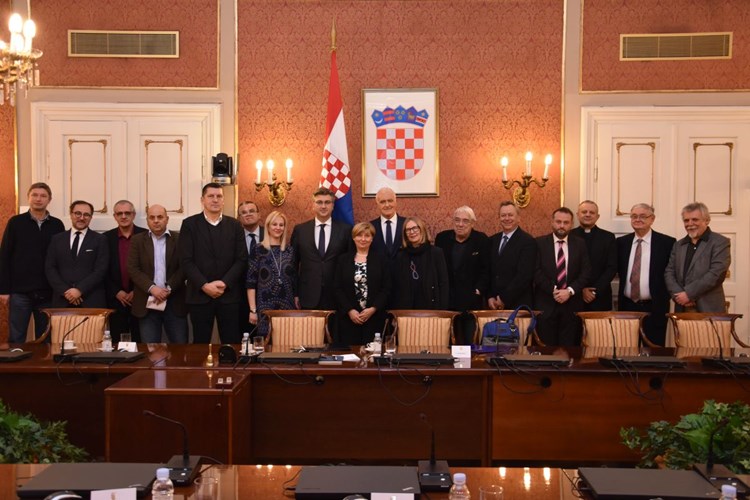- Published: 01.03.2018.
PM Plenkovic: Gov't would analyse the council's recommendations and see how could help improve the legislative framework
The council for dealing with the consequences of the rule of undemocratic regimes concluded its work on Wednesday, recommending sanctions for the use of symbols of totalitarian regimes, with an exception that the WWII-era Ustasha salute "For the homeland ready" can be used for commemorative purposes subject to prior permission, a press conference was told.
The council, composed of 17 experts in different scientific fields and of different political inclinations, concluded their work by adopting recommendations in the form of two documents, one dealing with historical issues and the other focusing on legal solutions to those issues.
Prime Minister Andrej Plenkovic thanked the council members for providing answers to all the questions asked and said that the recommendations would help gradually defuse the existing tensions and divisions in society.
"The document clearly reflects the actual mood in the country and I expect these recommendations to become basic guidelines in further legislative work," the PM added.
"Since the work of this council is closely associated with the installation of a HOS memorial plaque in Jasenovac, which contains a salute that is contrary to the constitution, the council has made it clear in its recommendations that the salute can be used in exceptional cases with prior permission," Plenkovic said.
Council chairman Zvonko Kusic said that the salute "For the homeland ready" can be used only on the coat of arms of the Croatian Defence Forces (HOS), the armed wing of the Croatian Party of Rights (HSP) during the 1991-1995 Homeland War.
"This is official tolerance, which has been inherited and which can be tolerated if strictly regulated," Kusic added.
The symbols of the undemocratic regimes can be used only at commemorative events for persons who were killed under those symbols and not at large-scale events, Kusic said.
"Our recommendations could not be completely specific. The legislature will deal with the matter in greater detail and eventually judges will always look at the context, if it was an act of provocation. These are general guidelines. The council could not make recommendations for individual cases but provided a framework," Kusic concluded.
Plenkovic said that this problem concerned a small portion of the population, people who gave their lives defending the country in the Homeland War. "We have no doubts about this salute and its nature in the context of World War II. The context here is completely different and from another time," he said.
Kusic said that the five-pointed red star and communist symbols were not questionable but were ambiguous. "They have both positive and negative connotations. The part relating to the antifascist struggle and World War II is indisputable. But if it is about promoting hatred and violence, it can be subject to regulation. The legislature can regulate this matter if any such situations arise," he added.
The purpose of this document is to help us overcome major ideological divisions and look to the future based on reconciliation and truth about the past, Plenkovic said.
Plenkovic said that the government would analyse the council's recommendations and see how they could help improve the legislative framework. He highlighted the recommendation to strengthen the judicial and administrative capacity.
Text: Hina
